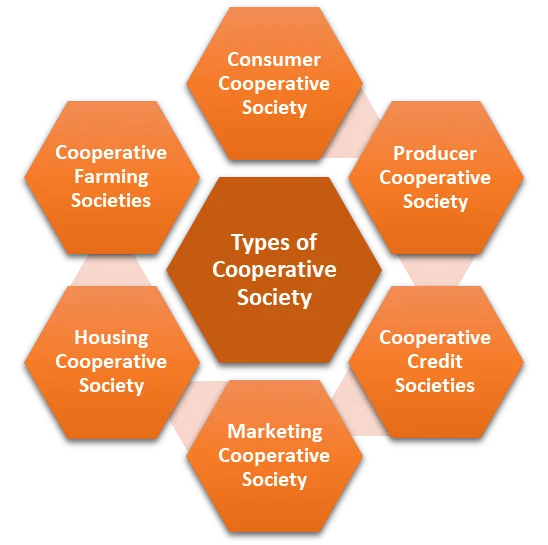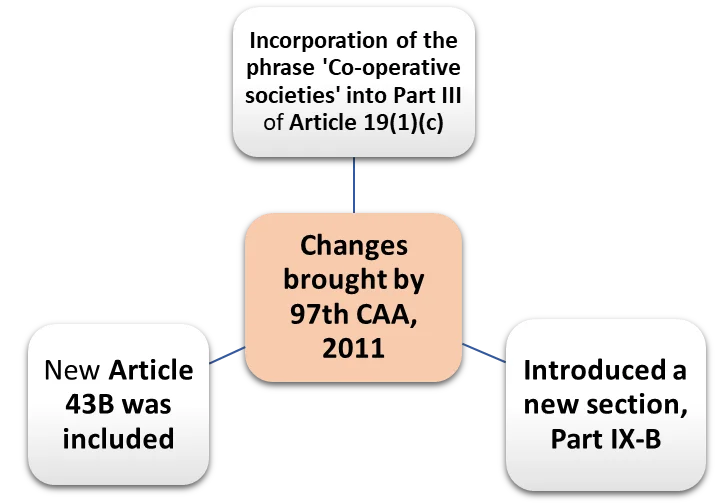A cooperative society is a democratic organization controlled by its members, who actively participate in decision-making. These societies are based on principles of cooperation, self-help, and mutual assistance, aiming to meet common needs and aspirations. Recognizing their importance, the Indian government granted them constitutional status through the 97th Constitutional Amendment Act of 2011.
Co-Operative Societies and the 97th Constitutional Amendment Act: An Overview
Democratic Principles and Constitutional Recognition of Cooperative Societies
- Definition and Membership of Cooperative Societies: A Cooperative society is a democratic organization controlled by its members who actively participate in the maintenance of its policy determination and decisions.
- Members of these societies are usually individuals or smaller organizations, such as farmers, artisans, small businesses, or consumers.
- Principles of Cooperation: Cooperative societies are governed by the principles of cooperation, self-help, and mutual assistance, and they aim to address the common needs and aspirations of their members.
- Constitutional Recognition: Being democratic in functioning and working for the public welfare, similar to Panchayati Raj Institutions, the Government of India decided to recognize them constitutionally through the 97th Constitutional Amendment Act of 2011.
Enroll now for UPSC Online Course
Brief History of Co-operatives in India
Pre-Independence phase
- Historical Roots: Cooperative initiatives in India trace their roots back to the late 19th century when efforts were made to alleviate the financial burden on farmers imposed by money lenders.
- Establishment: In 1901, a committee chaired by Sir Edward Law recommended the establishment of Co-operative Credit societies in India.
- Recognition of the Cooperative Movement: The cooperative movement in India gained official recognition with the introduction of the Cooperative Societies Act in 1904.
- The Agricultural Credit Cooperative Society of Kanaginahal village in Karnataka was the first cooperative Society formed under this law.
- Early Initiatives Among Labourers: Co-operative societies were initiated among labourers, and attempts at Co-operative housing were made, particularly in Bombay.
- Assessment and Development Proposals: In 1914, a committee led by Sir E.D. Maclagan assessed the situation and proposed significant developments in the movement in its 1915 report.
- Legislative Changes in the Post-War Era: The Government of India Act 1919 made Co-operation a transferred provincial subject, placing it under the supervision of a Minister after the conclusion of World War I.
Post-Independence Phase
- Turning Point Post-Independence: The period following India’s independence in 1947 marked a significant turning point, with cooperation being embraced as a tool for planned economic development.
- Emphasis by Leadership: India’s first Prime Minister, Pandit Jawaharlal Nehru, held a deep appreciation for cooperatives and aimed to instill a culture of cooperation throughout the nation.
- Agricultural Focus : This vision was reflected in the prioritisation of the agricultural sector during the five-year plans, leading to substantial growth of cooperatives in various sectors.
- Impact of the Cooperative System: Today, the Indian cooperative system ranks among the largest globally and stands as a vital pillar supporting the prosperity of agriculture and related sectors.
- Extensive Cooperative Network: In India, there are around 8.55 lakh cooperative societies of diverse types, boasting a combined membership of 29 crores covering nearly 91 per cent villages in the country.
- This extensive network includes 21 national cooperative societies, 390 State-level federations, 2,705 district federations, and 97,961 Primary Agricultural Societies (PACS) that oversee and guide the cooperative movement across the country.
- Examples: AMUL, Lijjat Papad, PMC Bank, IFFCO are few well known cooperative societies in India.
Types of Cooperative Societies
Consumer Cooperative Society: These societies cater to consumers seeking household goods at lower prices, obtaining products directly from producers in bulk and selling them to members. Examples include Super Bazar and Apna Bazar.

- Producer Cooperative Society: Also known as industrial cooperatives, these societies support small-scale producers, such as farmers, artisans, and herbal medicine producers.
- Members collaborate on production and distribution, minimising risks and eliminating intermediaries.
- Examples: include dairy, fish farmers, weavers, artisans, and tribal cooperatives.
- Cooperative Credit Societies: Urban and rural financial societies that offer low-interest loans to members, serving a crucial banking role.
- They provide deposit schemes and various loans, supported by government subsidies.
- Examples: include Teachers Co-op Credit Society and State Electric Board Employee Co-op Credit Society.
- Marketing Cooperative Society: Aimed at benefiting farmers, these societies focus on marketing produce at profitable prices, enhancing bargaining power, and protecting farmers from individual selling challenges.
- They assist in education, grading, pooling, processing, and provide storage and transportation facilities.
- Examples: include Milk Co-operatives in Gujarat, Maha Grape, and Cotton Marketing Co-ops.
- Housing Cooperative Society: Providing affordable housing to middle and low-income groups, members purchase shares in the cooperative instead of owning real estate.
- These societies construct residences or provide land for members to construct their homes. Common in urban and semi-urban areas.
- Cooperative Farming Societies: Addressing financial challenges of individual farmers, these societies allow farmers to retain land rights while pooling resources for joint cultivation.
- Cooperative farming can involve joint pre-sowing activities, equipment sharing, and joint selling.
- Variations include co-op tenant farming and collective farming co-ops with permanent membership and land rights transfer.
Constitutional Provisions: 97th Constitutional Amendment Act
The 97th Constitutional Amendment Act of 2011 conferred constitutional status and safeguards upon cooperative societies, and in this context, it introduced three significant changes to the Constitution:
- Incorporation of Cooperative Societies into the Constitution: The phrase ‘Co-operative societies’ was incorporated into Part III of Article 19(1)(c) of the Constitution.
- Recognition of Fundamental Rights: This vital amendment to Article 19(1)(c) recognizes the people’s right to establish cooperative societies as a fundamental right, granting them increased managerial autonomy and operational independence, while also safeguarding them from political interference.

- Introduction of Article 43B: A new Article 43B was included in the Directive Principles of State Policy (Part IV) concerning the ‘Promotion of Cooperative Societies.’
- This article emphasises that the State should strive to encourage the voluntary formation, self-governance, and professional administration of cooperative societies.
- Establishment of Part IX-B: The Amendment introduced a new Part, IX-B, to the Constitution, succeeding Part IX-A, titled ‘The Cooperative Societies’ (comprising Articles 243-ZH to 243-ZT).
- Objectives: This amendment was anticipated to ensure the democratic and autonomous operation of cooperatives, as well as enhance transparency in their management for the benefit of their members and other stakeholders.
Key provisions of the Part IX-B
Definitions of Co-operatives (Article 243 ZH)
- Co-operative Society: Refers to any society registered or presumed to be registered under the current cooperative society law in any State.
- Multi-State Co-operative Society: Denotes a group with objectives spanning multiple States, registered or presumed to be registered under the governing law.
- State-level Co-operative Society: Encompasses a cooperative society whose operational jurisdiction covers the entire State, as determined by the State legislature.
Incorporation of Cooperative Societies (Article 243 ZI)
- State legislatures may enact laws governing the formation, regulation, and dissolution of cooperative societies, adhering to principles like voluntary formation, democratic control, member participation, and autonomous functioning.
Number and Term of Board Members and Office Bearers (Article 243 ZJ)
- Determination of Board Size: The board’s size is determined by the State legislature, with a maximum limit of twenty-one directors.
- Reservation for Underrepresented Groups: Mandatory reservation of one seat for Scheduled Castes or Scheduled Tribes and two seats for women in cooperative societies with members from these categories.
- Term of Office for Board Members: Elected board members and office bearers serve a five-year term from the date of their election.
- Co-option of Experts: The State legislature can co-opt individuals with expertise in banking, management, finance, or related fields as board members, limited to two (in addition to the maximum of twenty-one directors).
- These co-opted members cannot vote or hold office.
- Inclusion of Functional Directors: Functional directors are considered part of the board but are not counted within the total limit of twenty-one directors.
Election of Board Members (Article 243 ZK)
- Board elections are to be held before the current board’s term expires, ensuring seamless transition.
- The responsibility for preparing electoral rolls and conducting elections in a cooperative society lies with a body designated by the State legislature.
Supersession and Suspension of Board and Interim Management (Article 243 ZL)
- Conditions for Supersession or Suspension: Boards may be superseded or suspended for up to six months under certain conditions, including persistent defaults, negligence, acts against the cooperative society’s interests, constitutional issues, or election-related failures.
- Exemption from Supersession: Cooperative societies without government shareholding, loans, financial assistance, or guarantees are exempt from supersession.
- Arrangements for Elections Post-Supersession: In the event of board supersession, an administrator must arrange elections within six months and transfer management to the elected board.
- Special Provisions for Banking Cooperative Societies: If a cooperative society is carrying out the business of banking, then the provisions of the Banking Regulation Act, 1949 shall also apply where the Board can be superseded and suspended for up to one year.
Audit of Accounts of Cooperative Societies (Article 243 ZM)
- Maintenance of Accounts: State legislatures can stipulate the maintenance of accounts by cooperative societies, requiring annual audits.
- Qualifications of Auditors: Auditors and auditing firms must meet minimum qualifications and experience criteria, approved by the State Government or its authorised body.
- Timeline for Audits: Cooperative societies must undergo audits within six months of the financial year’s end.
- Presentation of Audit Reports: Audit reports for apex cooperative societies must be presented to the State legislature.
Convening of General Body Meetings (Article 243 ZN)
- The State legislature can mandate annual general body meetings within six months of the financial year’s close.
Promoting transparency in Working (Article ZO)
- Members must have access to the cooperative society’s books, information, and accounts, and provisions can be made to ensure their participation in management. Cooperative education and training can also be promoted.
Returns (Article 243 ZP)
- Cooperative societies must submit annual returns to the designated authority within six months of the financial year’s end.
- These returns should cover various aspects, including an annual report, audited accounts, surplus disposal plans, by-law amendments, and details on general body meetings and elections.
Offences and Penalties (Article 243 ZQ)
- State legislatures can establish offences and penalties related to cooperative societies, covering aspects such as false reporting, disobedience of orders, non-payment by employers, failure to hand over documents, and corrupt practices during a board or office bearer elections.
Application to Multi-State Cooperative Societies (Article 243 ZR)
- The provisions in this part apply to multi-State cooperative societies, with modifications that replace references to “State Legislature,” “State Act,” and “State Government” with “Parliament,” “Central Act,” and “Central Government,” respectively.
Application to Union Territories (Article 243 ZS)
- This part’s provisions are applicable to Union territories, but the President can exclude any Union territory or part thereof via notification.
Continuance of Existing Laws (Article 243 ZT)
- Any existing State laws related to cooperative societies, inconsistent with the provisions of this part, remain in force until amended, repealed, or for a maximum of one year from the commencement of the Constitution (Ninety-seventh Amendment) Act, 2011.
Reasons for 97th Constitutional Amendment
Enhancing Co-operative Sector Performance
- The Co-operative sector exhibited weaknesses in protecting its members’ interests and achieving its intended objectives.
- Instances of postponed elections and prolonged terms of nominated office-bearers or administrators reduced accountability in the management of co-operative societies.
- Thus, to rectify these issues, it was imperative to introduce fundamental reforms that would revitalise these institutions.
Subject Under State Jurisdiction
- “Co-operative societies” falls under Entry 32 of the State list in the Seventh Schedule of the Constitution.
- However, despite significant growth, co-operatives have not consistently met the desired qualitative standards.
- Thus, it became evident that amending the Constitution was necessary to shield co-operatives from undue external interference and ensure their autonomous organisational structure and democratic operation.
Central Government’s Commitment to Reform
- The Central Government was committed to ensuring that co-operative societies in the country operate in a democratic, professional, autonomous, and financially sustainable manner.
- In pursuit of these objectives, it was proposed to introduce a new section in the Constitution that would encompass essential provisions governing the functioning of co-operative societies, with a focus on democratic, autonomous, and professional operation.

Enroll now for UPSC Online Course
| Must Read | |
| Current Affairs | Editorial Analysis |
| Upsc Notes | Upsc Blogs |
| NCERT Notes | Free Main Answer Writing |
Conclusion
The 97th Constitutional Amendment Act of 2011 strengthened cooperative societies by granting them constitutional status and safeguarding their autonomy and democratic functioning.
- This amendment aimed to enhance transparency and management, ensuring cooperatives operate professionally and sustainably.
- These changes were necessary to protect cooperatives from undue interference and support their significant role in India’s economic development.
Sign up for the PWOnlyIAS Online Course by Physics Wallah and start your journey to IAS success today!
| Related Articles | |
| Major Constitutional Amendments | Panchayati Raj Institution Under 73rd Constitutional Amendment |
| Co-operative Societies in India | Fundamental Rights (Article 12-35) |

 GS Foundation
GS Foundation Optional Course
Optional Course Combo Courses
Combo Courses Degree Program
Degree Program









